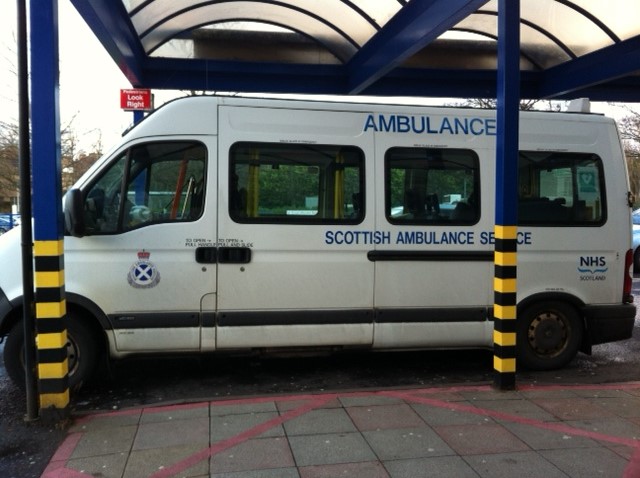Patient at continuing risk
 There is a growing financial crisis in NHS Scotland. NHS spending is not ‘protected’ from austerity measures. With little scope to deviate from the current footprint of acute services this year, for the first time ever, health boards are potentially producing unbalanced Local Delivery Plans. There’s an increase demand to move to community-based services but with no political appetite to provide sufficient resources of trained staff and finance, the shift will not become a reality.
There is a growing financial crisis in NHS Scotland. NHS spending is not ‘protected’ from austerity measures. With little scope to deviate from the current footprint of acute services this year, for the first time ever, health boards are potentially producing unbalanced Local Delivery Plans. There’s an increase demand to move to community-based services but with no political appetite to provide sufficient resources of trained staff and finance, the shift will not become a reality.
With the SNP not returning an overall majority, this will potentially give rise to consensual politics within the Scottish Parliament – something that UNISON has called for in relation to the NHS for some time. So how will the party manifesto commitments translate into delivering healthcare for the Scottish population? NHS Scotland remains a priority within the party manifestos but the shape and focus differ in some part in policies and funding commitments.
Scottish Labour stated it would protect the NHS from privatisation, with commitments to fully support UNISON’s Ethical Care Charter in social care. However, this needs to be seen in the context of health and social care integration with significant service and budget responsibility moving to the Integrated Joint Boards (IJBs) established in April 2016. This significant reform of public service provision opens the door to further privatisation of social care (and potentially health services) commissioned by the IJBs.
Both SNP and Labour gave commitments to increase health spending in vital areas: health visitors; advanced practitioner in nursing and AHPs; and medical staffing with a particular focus on GPs. All this comes with a price tag and unless fully funded, under the current financial crisis, health boards will not be able to deliver.
The Tories proposed to protect health spending in Scotland with the health budget rising annually in line with the Barnett Consequentials. As expected, they’d move away from a universal service with as a starter the re-introduction of prescription chargers which they have estimated to generate £65m by the end 2021.
During the campaign, a number of NHS services were debated but the main issues focussing the minds of the parties were major trauma centres, integration of health and social care and GP out-of- hour provision.
Labour committed to investing in four major trauma centres (Glasgow, Edinburgh, Dundee and Aberdeen), something it says the SNP has broken its promise on. The SNP manifesto highlighted the same four trauma sites but referred to the trauma network. If this does become a reality, it will mean one major trauma centre in the West and three in the East. The former will be required to service 2.6m people covering Ayrshire and Arran, Dumfries and Galloway, Forth Valley, Greater Glasgow and Clyde and Lanarkshire. Notwithstanding geographical dispersion, surely there is the need to examine the case for three in the East or to increase the number in the West.
All the manifestos highlighted the huge pressures on GP delivery services and made commitments to invest here. The Ritchie Review of 2015 made 28 recommendations for health boards to ensure they could provide out-of-hours services (among them multi-agency teams).
One of the main pressures on NHS spending is delayed discharge. It is estimated the current number of patients in hospital across Scotland who do not need to be is the equivalent to number of beds in the new Queen Elizabeth II Hospital in Glasgow. IJBs need to be properly funded to deliver the quality and capacity of social care to get people into social settings.
Decisions that should be based on care and clinical need are heavily dependent on financial and human resources (like the ability to recruit, train and retain a skilled and fairly paid workforce). The current NHS Scotland Healthcare Strategy (published in February 2016) takes little account of the new integrated approach to health and social care provision. It rightly focuses on ensuring safe, effective, person-centred and sustainable services delivered through a workforce that has the right skills and competencies and is able to achieve the best possible outcomes for patients. It is notable this strategy does not have a Ministerial Foreword giving government support.
Additionally, the strategy has little insight into the potential drive towards future public service reforms which the SNP highlights require structural and regulatory change. This will undoubtedly impact on local council’s provision through the IJB. There is a need for the union movement to move from a reactive mode to more of a proactive engagement to influence the decisions that will shape public services for the next generation. Staff governance arrangements and work emanating from the Fair Work Convention give us some leverage to seek to achieve this and be a voice for the workforce on how best to achieve quality outcomes for our citizens and taxpayers.
Lilian Macer is the Convenor of UNISON Scotland and an Employee Director at NHS Lanarkshire



